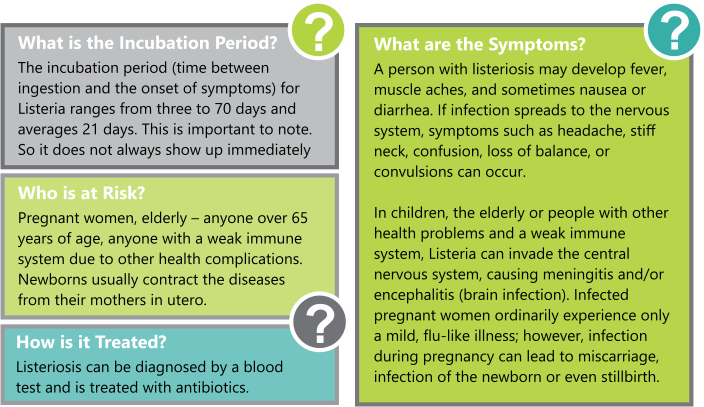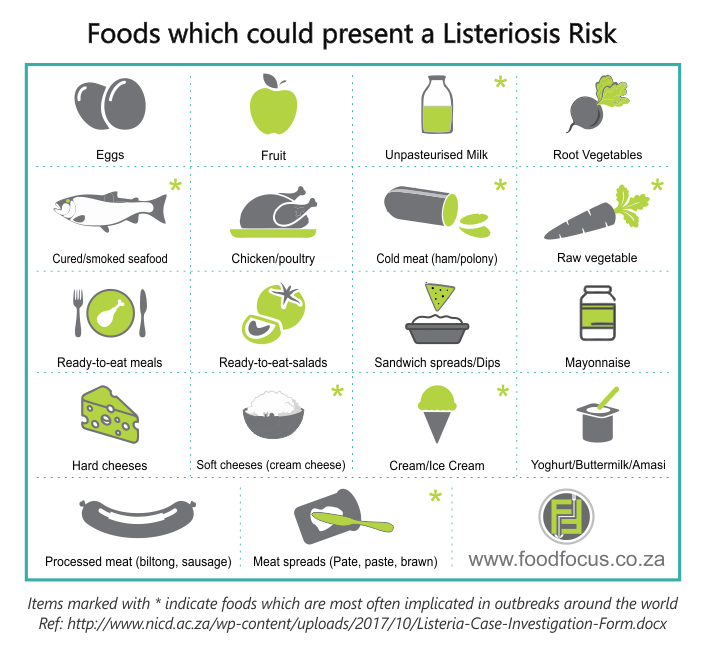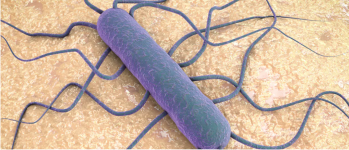The National Institute for Communicable Diseases (NICD) is reporting a very large outbreak of Listeriosis in South Africa. To date there have been over 550 cases reported, mostly in Gauteng. Here are some facts that you should know.
What is listeriosis?
Listeriosis is a serious infection caused by eating food contaminated with the bacterium called Listeria Monocytogenes. Although there are other types of Listeria, most cases of listeriosis are caused by Listeria Monocytogenes. Listeria is found in soil and water so vegetables can become contaminated from the soil or from manure used as fertilizer and even animals can carry the bacterium without appearing ill, and can then contaminate foods of animal origin, such as meats and dairy products.

What can I do to prevent getting the illness?
- Listeria can grow at refrigerated temperatures and so you must consume perishable and ready-to-eat foods as soon as possible and definitely by the use by date.
- Listeria is killed by heating so make sure you thoroughly cook raw food from animal sources, such as beef, pork, or poultry.
- Listeria occurs in soil, make sure you wash raw vegetables thoroughly before eating.
- Keep uncooked meats separate from vegetables and from cooked foods and ready-to-eat foods.
- Pasteurisation kills listeria so avoid unpasteurized (raw) milk or foods made from unpasteurized milk.
- Practice proper hygiene in your kitchen by washing hands, knives, and cutting boards after handling uncooked foods.
What Foods could be at risk of Listeria?
Listeria has been found in a variety of raw foods, such as uncooked meats and unpasteurized (raw) milk or foods made from unpasteurized milk. Listeria is killed by pasteurization and cooking; however, in certain ready-to-eat foods, like hot dogs and cold cuts from the deli counter, contamination may occur after cooking but before packaging.
The foods in the chart below are being considered by The National Institute for Communicable Diseases (NICD):
Ref: http://www.nicd.ac.za/wp-content/uploads/2017/10/Listeria-Case-Investigation-Form.docx

Download Listeria Factsheet 25Jan2018.pdf
Foods most often implicated in outbreaks around the world:
The pathogen has been isolated from a very wide range of processed foods including pâtés, milk, soft cheeses, ice cream, ready-to-eat cooked and fermented meats, smoked and lightly processed fish products and other seafood. Celery, sprouts, cantaloupe have also been identified.
Ref: http://www.foodsafetywatch.org/factsheets/listeria/ & https://www.cdc.gov/listeria/prevention.html
Want to know more:
http://www.nicd.ac.za/assets/files/Listeriosis.pdf
https://www.cdc.gov/listeria/index.html
http://www.listeriablog.com/about/
Attorney Janusz Luterek, addresses questions on the legal implications of the listeria outbreak for the food industry...
There is currently a very large outbreak of listeriosis in South Africa. According to the National Institute of Communicable Disease (NICD), over 550 cases reported since the start of 2017. (Dec 2017)...
The National Institute for Communicable Diseases has received reports of a marked increase in the number of cases in South Africa in the last few months, mostly in Gauteng. The stats are now sitting at 190 confirmed cases across the country this year. ...
There was a great response to our recent article on Listeria. Needless to say it has been a very topical issue in the last two months. We have done a lot of research on how to eradicate the problem and have come across some great resources to share with you....
Over 80 years ago, L. monocytogenes was recognized as an animal pathogen that was widespread in nature, in soil, decaying vegetation and the bowels of many mammals. But in 1983 the first human outbreak was reported in Canada, proving that indirect transmission from animals to hum...









